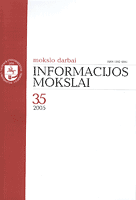Kultūros paveldo socialinių technologinių sistemų aspektai
Aspects of Socio-Technological Systems of Cultural Heritage
Author(s): Zinaida ManžuchSubject(s): Economy
Published by: Vilniaus Universiteto Leidykla
Summary/Abstract: Management of cultural heritage in the digital environment is a dynamic and rapidly expanding multidisciplinary domain of research and practice emerged on the intersection of library and information, archival sciences, museology, and informatics. Communication of cultural heritage applying information and communication technologies (ICT) is in the focus of this field. Research and practice in cultural heritage management in the digital environment was influenced by informatics‘ approaches, and, as a consequence, was affected by technological determinism, which suggested a limited focus at technical aspects of the development and exploitation of information systems and ignored underlying human, social and cultural issues. In spite of expanded access in the digital age growing volumes of digital and digitized cultural heritage content didn‘t provide wide use of information resources and their integration into user‘s learning, work and leisure. Limitations of technological determinism encouraged to shift focus to social, human and cultural aspects of communication of cultural heritage in the digital environment. This transition was marked by the adoption of the model of socio-technological system offered by social informatics, and emergence of branch disciplines, such as museum and archive informatics, studies in libraries as sociotechnological systems. In the light of social informatics theory, the main feature of socio-technological systems is usability that is also crucial for the modern memory institutions, providing digital cultural heritage services. The main objective of the article is to define the main directions and emerging challenges in integration of usability principles into development and exploitation of ICT-based cultural heritage systems. The article contains theoretical analysis of 1) concepts of cultural heritage socio-technological system and usability, and 2) usability management processes and methods. On the basis of theoretical analysis several conslusions are made. Multidisciplinary domain of socio- technological systems opens new perspectives for the research of communication of cultural heritage in the digital environment. Usability becomes an integral part of quality management activities in memory institutions, expands traditional practices in the field, and raise new competence requirements for information specialists. Theoretical models and ISO standards may be applied to create a framework for usability management in memory institutions both on strategic and operational levels. However, further research in the scope of joint cultural heritage services, audiences, contexts of use and applied technology in the sector of memory institutions should be performed.
Journal: Informacijos mokslai
- Issue Year: 2006
- Issue No: 38
- Page Range: 38-51
- Page Count: 14
- Language: Lithuanian

